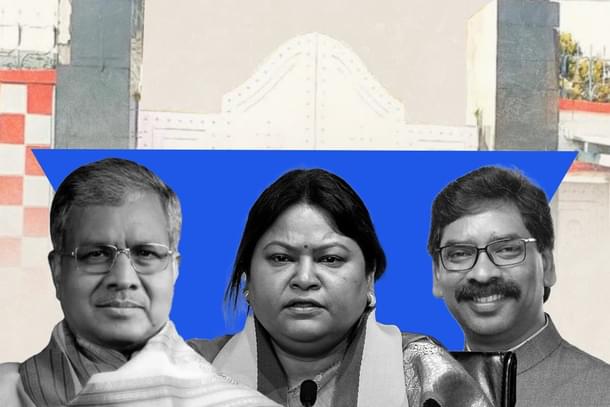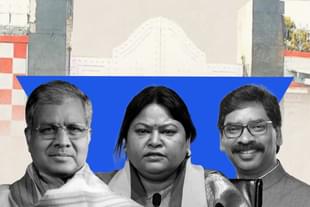Politics
Four High Profile Seats In Jharkhand For Second Phase
Abhishek Kumar
Nov 19, 2024, 07:00 PM | Updated 07:13 PM IST
Save & read from anywhere!
Bookmark stories for easy access on any device or the Swarajya app.


As Jharkhand prepares for its second and final round of voting, four constituencies—Jamtara, Dhanwar, Barhait, and Jharia—capture everyone’s attention.
From possibility of larger tribal-minority alliance going for a toss in Jamtara to the deeply rooted family rivalry in the heart of Coalanchal, each seat has its own characteristics.
In Jamtara, the face-off between Sita Soren of the Bharatiya Janata Party (BJP) and Congress’s Irfan Ansari offers a possible solution for BJP’s tribal-minority alliance problem.
Soren, a three-time MLA and daughter-in-law of Jharkhand Mukti Morcha (JMM) founder Shibu Soren has emerged as a formidable female tribal face. Her opponent, Irfan Ansari, a senior Congress leader and sitting MLA is Muslim face of Indian National Inclusive Developmental (INDI) Alliance.
However, tensions escalated after Ansari’s controversial remark, where he allegedly referred to Sita Soren as “rejected goods". . Senior BJP leaders released statements against it and the party has tried its best to capitalise on it.
It is being highlighted as an insult to both tribals’ self-respect and women. Old clips of Ansari are also being circulated in local Whatsapp groups to showcase his alleged antipathy for tribals.
If BJP is able to win this seat, then its significance will be greater than just an assembly seat victory.
BJP state President and frontrunner for chief minister from the party, Babu Lal Marandi, is contesting from the Dhanwar seat. Incidentally, Dhanwar was not always the preferred seat for him since he lost from here in 2014 after leaving Ramgarh.
In 2019, he won from Dhanwar from the Jharkhand Vikas Morcha (JVM) - his own party. Later he came back to BJP fold and was reassigned its state President duties.
In political circles, it is widely believed that Marandi sought to position himself as a chief ministerial candidate, fueling a cold war between his faction and Raghubar Das’s cadre. Observing Hemant Soren’s growing traction among tribals, the BJP chose to back Marandi, a tribal leader, and appointed Das as the Governor of Odisha.
However, Niranjan Rai, an entrepreneur and social activist announced his candidature from the seat. Rai is popular among all sections of the constituency which would mean significant reduction in vote for Marandi.
BJP had to muster its forces - Himanta Biswa Sarma, Godda Parliamentarian Nishikant Dubey and other senior leaders - to ask Rai for support. Both leaders reached his village Peepalo to convince him. Efforts paid off as Rai joined BJP in the presence of home minister Amit Shah.
The opposition alliance sees Dhanwar as an opportunity to weaken the BJP in a symbolically important constituency, leveraging local grievances such as unemployment and agricultural issues. Meanwhile, the BJP is banking on its broader Hindutva narrative to retain tribal support in this strategically important seat.
In Barhait, Chief Minister Hemant Soren is defending a constituency that has long been a bastion for the JMM. The stakes are especially high for Soren, as his tenure as Chief Minister is under scrutiny.
His administration claims to have implemented several welfare programs aimed at tribal upliftment, but allegations of corruption and governance lapses have given his opponents ammunition. This election takes on a new dimension with the BJP fielding Gamliel Hembram - a candidate who has recently returned to the Sanatan fold after years outside.
The BJP’s narrative in Barhait emphasises cultural identity, portraying its candidate as a symbol of a return to traditional values. This approach has resonated with certain sections of the tribal electorate, adding an unexpected layer to the contest.
For Soren, Barhait represents more than just a personal political challenge; it is a referendum on his leadership and the JMM’s dominance in Santhal Pargana. The outcome here will influence the larger trajectory of the party’s role in Jharkhand’s politics.
Jharia, in Dhanbad district, is unlike any other constituency in the state. Its political story is steeped in family rivalries, coal politics, and personal tragedy. The Singh family, whose house is often referred to as the “Singh Mansion,” has been a dominant force in Jharia for decades.
The family's journey was highlighted in famous Gangs of Wasseypur movie.
Its rise began with Suryadeo Singh, a powerful leader and former MLA who built his influence through a combination of political acumen and ties to the coal industry.
The family’s legacy, however, fractured in 2017 when Neeraj Singh, the nephew of Suryadeo Singh and a rising political star, was assassinated. Neeraj, who served as the Deputy Mayor of Dhanbad, was killed in a brazen attack allegedly orchestrated by his cousin, Sanjeev Singh, a sitting BJP MLA.
The murder brought the deep divisions within the Singh family to the forefront.
In the 2019 assembly elections, the rivalry took a new turn when Neeraj Singh’s widow, Purnima Singh, contested the Jharia seat on a Congress ticket against Ragini Singh, the wife of Sanjeev Singh.
Purnima Singh emerged victorious, carving a niche for herself while keeping Neeraj’s legacy alive. The 2024 elections see the rivalry reignited, with Purnima Singh seeking re-election against Ragini Singh, who represents the BJP.
While the contest retains its deeply personal undertones, it also brings to the fore pressing issues such as rampant pollution from underground coal fires, health crises, and exploitation by coal mafias.
Jharia is emblematic of the challenges faced by resource-rich constituencies, where economic gains often come at the cost of environmental and social well-being.
As alliances are tested and rivalries reignited, the outcomes at these four seats will set the tone for the state’s political trajectory.
Abhishek is Staff Writer at Swarajya.




